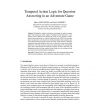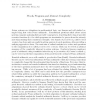25 search results - page 4 / 5 » Logical Foundations of (e)RDF(S): Complexity and Reasoning |
LPNMR
2004
Springer
13 years 11 months ago
2004
Springer
Abstract. We consider the simpliļ¬cation of logic programs under the stablemodel semantics, with respect to the notions of strong and uniform equivalence between logic programs, r...
ARTS
1999
Springer
13 years 10 months ago
1999
Springer
Stochastic process algebras such as PEPA provide ample support for the component-based construction of models. Tools compute the numerical solution of these models; however, the st...
AGI
2008
13 years 7 months ago
2008
Inhabiting the complex and dynamic environments of modern computer games with autonomous agents capable of intelligent timely behaviour is a significant research challenge. We illu...
AI
2008
Springer
13 years 4 months ago
2008
Springer
Although classical first-order logic is the de facto standard logical foundation for artificial intelligence, the lack of a built-in, semantically grounded capability for reasonin...
CSL
2007
Springer
13 years 12 months ago
2007
Springer
Programs and Abstract Complexity A. Beckmann University of Wales Swansea Swansea, UK Axiom systems are ubiquitous in mathematical logic, one famous and well studied example being ļ...


